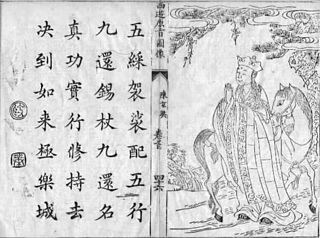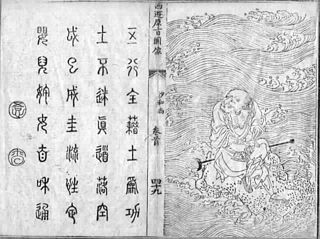Related Research Articles

Journey to the West is a Chinese novel published in the 16th century during the Ming dynasty and attributed to Wu Cheng'en. It is regarded as one of the great Chinese novels, and has been described as arguably the most popular literary work in East Asia. It is widely known in English-speaking countries through Arthur Waley's 1942 abridged translation, Monkey.

Tang Sanzang is a Buddhist monk and pilgrim who is a central character in the 16th century novel Journey to the West by Wu Cheng'en. Tang Sanzang is based on the historical Tang dynasty monk Xuanzang.

Sha Wujing is one of the three disciples of the Buddhist pilgrim Tang Sanzang in the 16th century novel Journey to the West written by Wu Cheng'en in the Ming dynasty, although versions of his character predate the Ming novel. In the source novel, his background is the least developed of the pilgrims, and he contributes the least to their efforts.

Journey to the West is a Chinese television series adapted from Wu Cheng'en's 16th-century novel of the same name. It was directed by Yang Jie and stars Liu Xiao Ling Tong as Sun Wukong, Chi Chongrui as Tang Sanzang, Ma Dehua as Zhu Bajie, and Yan Huaili as Sha Wujing.

Monkey: A Folk-Tale of China, more often known as simply Monkey, is an abridged translation published in 1942 by Arthur Waley of the sixteenth-century Chinese novel Journey to the West conventionally attributed to Wu Cheng'en of the Ming dynasty. Waley's remains one of the most-read English-language versions of the novel. The British poet Edith Sitwell characterized Monkey as "a masterpiece of right sound", one that was "absence of shadow, like the clearance and directness of Monkey's mind." The translation won the James Tait Black Memorial Prize in 1942.

Zhang Jinlai, better known by his stage name Liu Xiao Ling Tong, is a Chinese actor, best known for his role as the Monkey King in the 1986 television series Journey to the West adapted from the classic Chinese novel of the same name. Zhang adopted his father Zhang Zongyi's stage name, Liu Ling Tong, and amended it to Liu Xiao Ling Tong.
The Fantastic Magic Baby (紅孩兒) is a 1975 film directed by Chang Cheh. The film is based on selected chapters of Wu Cheng'en's classical 16th century novel Journey to the West focusing on the story of Red Boy.

Baigujing is a demon from the 16th century novel Journey to the West. The name is translated into English as White Bone Spirit in the William John Francis Jenner translation. Baigujing is a shapeshifting demoness, and in her true form she is depicted as a skeleton.

A Chinese Tall Story is a 2005 Hong Kong fantasy adventure film written and directed by Jeffrey Lau. The story is loosely based on the 16th-century novel Journey to the West.

Journey to the West is a Chinese television series adapted from the 16th-century novel of the same title. Production for the 66 episodes long series started on 12 September 2009, and it was first broadcast in mainland China on 28 July 2011 on TVS. The series was produced by Zhang Jizhong and was released a year later than another television series of the same title, but with a different cast and crew.

Journey to the West is a Chinese television series adapted from the 16th-century novel of the same title. The series was directed and produced by Cheng Lidong and starred Zhenxiang, Victor Chen, Xie Ning and Mou Fengbin in the leading roles. It was first aired on Zhejiang Satellite TV (ZJSTV) in China on 14 February 2010. This version is not to be confused with the 2011 television series of the same title produced by Zhang Jizhong.

Journey to the West: Conquering the Demons is a 2013 fantasy comedy film co-written and produced by Stephen Chow and co-directed by Chow and Derek Kwok. The movie was first announced in July 2011 and was released on 10 February 2013 in China. The film is a loose comedic re-interpretation of the 16th-century novel Journey to the West, a Chinese literary classic often believed to be written by Wu Cheng'en.

The White Dragon Horse, known as Bai Long Ma, and Yü Long, in Chinese, is one of the main characters in the 16th-century Chinese novel Journey to the West. He is Tang Sanzang's steed who later became one of the Babu Tianlong Guangli Bodhisattva at the end of novel.

Ma Dehua is a Chinese actor best known for his role as Zhu Bajie in the 1986 television series Journey to the West.

The Monkey King 2 is a 2016 Hong Kong-Chinese action fantasy film based on the classic 16th-century novel Journey to the West by Wu Cheng'en. The film was shot in 3D and is a sequel to the 2014 box office hit The Monkey King with Soi Cheang returning as director and Sammo Hung as action director, who replaces Donnie Yen's role from the previous installment. The film stars Aaron Kwok, who portrayed the main antagonist in the previous installment, as the film's titular protagonist, who also replaces Yen from the previous installment. Other cast for the film included Feng Shaofeng, Xiao Shenyang, Him Law, Fei Xiang, Kelly Chen, and Gong Li.
Chi Chongrui is a Chinese actor famous for his role as Tang Sanzang in the 1986 television series Journey to the West.
Liu Dagang is a Chinese actor best known for his role as Sha Wujing in the 1986 television series Journey to the West. He is a National Class-A Actor.

The Monkey King 3 is a 2018 Chinese–Hong Kong fantasy film based on the classic novel Journey to the West by Wu Cheng'en. The film is the third installment of the Monkey King franchise, after The Monkey King (2014) and The Monkey King 2 (2016). Directed and produced by Soi Cheang, the film stars Aaron Kwok, Feng Shaofeng, Xiao Shenyang, Him Law and Zhao Liying.

Kuimulang is a deity in traditional Chinese spiritual beliefs. He is considered to be one of the 28 Mansions, which are Chinese constellations. These constellations are the same as those studied in Western astrology. Kuimulang originated from the ancient Chinese worship of the constellations, a spiritual practice that combines Chinese mythology and astronomy.
References
- 1 2 "3-D series to hit smallscreen in China - Ancient tale 'Wu Cheng' gets high-tech treatment".
- ↑ "Wu Cheng'en and Journey to the West (2010) - China - Film Cast - Chinese Movie".
- ↑ ""立体西游记"将播 齐鲁台免费发3D眼镜". sina.com.cn. 2010-06-29. Retrieved 2019-01-31.